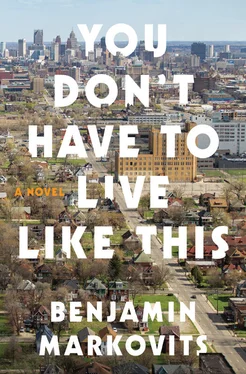Robert had some idea of getting us to talk seriously about our futures, but in fact all we talked about is where we wanted to live after graduation — LA, New York, Boston, Chicago, New Orleans. Most of us defended our home states, except for Johnny Mkieze and Bill Russo, who both came from Detroit. Johnny was born in Lagos, though, and went to school at Country Day, which (as Bill pointed out) is as much like Detroit as Yale is like New Haven. Bill’s father was a real Detroiter. He grew up in Indian Village and bought his first house on Ellery Street; they only moved out when Bill’s mom got pregnant. Now half the block was boarded up, burned down or sitting empty. This may have been the first time I heard about what was happening to Detroit.
At the end of the meal, Robert ordered a Cup — a large urn filled with homebrewed punch. Another embarrassing tradition. Nobody was really drunk enough, but we sang anyway, Put a nickel on the drum , all that bullshit, passing the Cup around and drinking and singing. One song led to another. Bright college years, with pleasure rife, the shortest, gladdest years of life. Bulldog Bulldog bow wow wow. For God, for country and for Yale. Walter had a beautiful voice, a little thin maybe but light for a big man and clear as a bell. For a while he was singing by himself: We’re poor little lambs who have lost our way! Baa baa baa! I don’t think anyone considered the evening a success.
BEATRICE BROKE UP WITH ROBERT “for good” a few weeks before Christmas, senior year. “Because he had never heard of Pinter,” she said to me one night, but I’m sure there were other reasons.
She was standing in the courtyard drinking beer when I bumped into her. “Let’s get out of here,” she said. “Have you ever been to the top of the clock tower? I know someone with a key.”
So I followed her into the library and then up the cold stone stairs. There’s a seminar room at the top, and next to the stairwell another door I’d never tried to go in.
“I know the guy who cleans up around here,” she said. “A student. He always leaves his key behind one of the books. For smokers.”
She couldn’t find the key, but it turned out when we tried it a few minutes later that the door was unlocked. There was another staircase behind it, colder and narrower than the first and made of wood, with maybe a hundred cigarette butts underfoot. Beatrice went first. She had on boots with heels and moved awkwardly in the dark. The door at the top was also open, and we stepped out onto a narrow balcony, into the outside air.
There was snow on the ground, a long way below, and Beatrice put an arm around me. She wasn’t wearing a coat, just a wool scarf bundled up around her neck, and I found it disconcerting how close her face was. In spite of her good looks, or maybe because of them, she had quite a forceful, almost male presence — strong bones and broad shoulders. She used to swim in high school.
“What are you going to do next year?” she said.
“I’m not sure. I’ve applied for a couple of fellowships to Oxford. My brother got one and had a good time over there.”
“Do you always do what your brother did?”
“Look,” I said, “if you want to give me a hard time, you can go to someone else for human warmth.”
She let go of me then and stood a little apart. There was not much wind, even up in the tower, but zero cloud cover, and the temperature was somewhere in the twenties. All the time we were talking, students carrying various kinds of bags — backpacks and shopping — came and went through the college gates.
“Oh, it’s too cold to argue,” Beatrice said and lit a cigarette. When she had finished, with cold jittery fingers, she breathed in and out and leaned against me again.
“Why did you really break up with him?” I asked.
“I told you, because he had never heard of Pinter. Do you know what his GPA is? Three point two, three point three, something like that. God, I sound like such a snob — I am a snob. But after two years of dating I finally realized he isn’t very bright. Does this make me a bad human being? But you don’t believe me.”
“No, not really.”
“You think he is very bright?”
“I think he has a kind of efficient intelligence. But that’s not what I don’t believe.”
“Yes, he has a kind of intelligence. The trouble is, he thinks it is better than real intelligence.”
“I’m not sure what that is.”
“Yes, you are. It’s what you have, it’s what I have.”
“The way you put it doesn’t make it sound very nice.”
“It’s very important to you to be nice, isn’t it? I think this is why you don’t have many girlfriends.”
“Do girls not like nice boys?”
She let go of me again and eventually she said, “This is a very stupid conversation. This is the kind of stupid conversation I had freshman year.” And I could see (I should have seen it before) that she was really quite unhappy, and that her bright sarcastic mood was just the surface of it.
To change the subject, I asked, “And what are you going to do next year?”
“I don’t know. For a while, Robert and I talked about moving in together, probably in New York. Finding jobs. Maybe I’ll do that anyway.”
“What’s Robert planning?”
“I think he’s stuck, and he knows it. He’s not as smart as his father is; he knows that, too.”
“Walter is convinced he’s going to run the country some day.”
“Walter is a little in love with all of us,” she said.
Somehow her saying this changed the tone again. It really was very cold, and Beatrice had begun to look pale. Her lips were blue and the cigarette in her hand shook.
“What am I doing, let me give you my coat.”
“No, let’s go back down,” she said but stayed where she was, so I put my arm around her again and rubbed her side. “I don’t want to go out in the world,” she added, in the mock plaintive voice of the spoilt pretty girl.
I thought, if you were normal, standing here like this, you would kiss her. And it’s true, I had been sort of in love with her for almost three years. I say sort of, because what made me unhappy about it was mostly the fact that this feeling of being in love had so little to do with my actual relations with her, with our friendship, which was real enough. My sexual feelings towards her were adolescent, somehow masturbatory, not very nice. While in reality I was a pretty good friend to Beatrice.
She said again, “Let’s go back down,” and this time we went.
When we reached the landing, where the cigarette butts were, the light of the seminar room showed along the edge of the doorway. And for a second I thought, in a mild panic, that someone might have locked us in. But the door opened easily; the light inside seemed very bright.
It was much warmer, too, and Beatrice said, “God, I was getting fucking cold. I kept thinking you were going to kiss me.” Walking through the courtyard afterwards she held my hand.
I DIDN’T SEE MUCH OF Robert that spring, which was our last term at Yale. Everybody was busy applying for whatever it was they wanted to do in the fall. Walter planned to take a year out before applying to theater-studies programs. Maybe live with his parents in Maine and write plays, or teach part-time at the local high if he got bored. Beatrice won a Shorenstein Center scholarship at the Kennedy School in Harvard. Her undergraduate major was comp lit, but she had decided to do a master’s in international development.
Nobody knew what Robert had lined up. A few weeks before graduation I got another invitation from him, this time delivered by email. He was organizing an end-of-year dinner with one of his poli sci professors, Clay Greene. The email went out to most of the usual suspects: me and Walter, Bill Russo, Johnny Mkieze. Even Beatrice got an invite. I guess they were on speaking terms again. Robert promised everyone a free meal at the Grand Union Café.
Читать дальше












